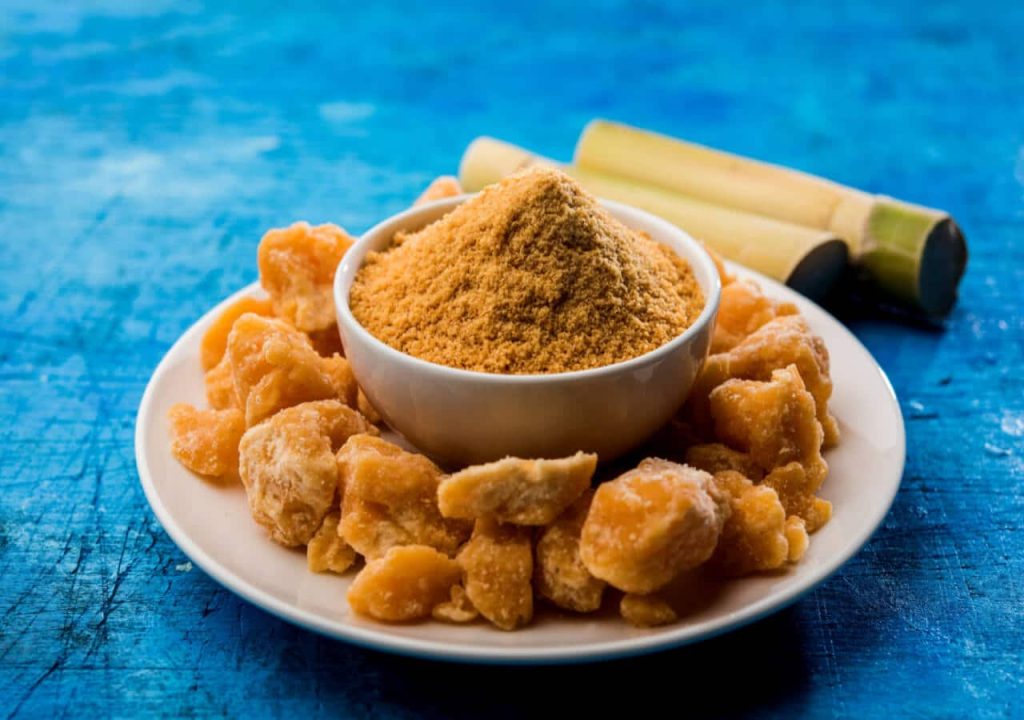Introduction:
In Nepali, jaggery is commonly known as “gur” or “chaku.” It is significant in Nepali cuisine and culture and is often used as a sweetener and flavor enhancer in various dishes and desserts. Jaggery is derived from the sap of palm trees or sugar cane, which is boiled and then poured into molds to solidify, resulting in blocks or cakes of this natural sweetener.
It’s a nutritious superfood with a deep flavor that provides a popular ingredient in Nepali households. This extensive manual explores the significance of jaggery in Nepali culture, its price in Nepal, its numerous benefits, and its overall impact on health.
It is a traditional sweetener that evaporates sugarcane juice or palm sap water. The process involves boiling the raw juice, allowing it to cool and harden into thick blocks or cakes. Unlike refined sugar, which undergoes extensive processing, jaggery retains much of sugarcane’s natural minerals and vitamins.
The Richness of Flavor:
One of the most appealing aspects of jaggery is its distinctive flavor profile. Depending on where the sugar cane or palm is sourced and the processing methods employed, the flavor can range from mildly sweet to rich and caramel-like, with notes of molasses and toffee. This flavor complexity adds depth and character to dishes, making jaggery a beloved ingredient in savory and sweet recipes.
Versatile in Culinary Applications:
Jaggery’s versatility in the kitchen knows no bounds. In South Asian cuisines, it’s a key component in traditional sweets like “gulab jamun,” “laddoos,” and “halwa,” imparting a natural sweetness and depth of flavor. It’s also used in savory dishes such as chutneys, sauces, and marinades, where its caramel notes complement spices and enhance the overall taste profile.

Beyond South Asia, jaggery has found its way into global cuisine. In Latin America, it’s used to prepare desserts like “dulce de leche” and “cajeta,” adding a unique twist to these classic treats. In Africa, it’s incorporated into dishes like “moi moi” and “peanut stew,” contributing a subtle sweetness that balances savory and spicy flavors.
A Nutritional Powerhouse:
What sets jaggery apart from refined sugar is its nutritional profile. Unlike its processed counterpart, which is stripped of nutrients during refining, jaggery retains significant amounts of iron, magnesium, potassium, and antioxidants, including vitamins and minerals. This makes it a healthier alternative to white sugar, offering sweetness and essential nutrients that support overall well-being.
You can Read More: Chaku: A Traditional Nepali Delicacy
Jaggery Price in Nepal:
The price of jaggery in Nepal can vary depending on various factors such as quality, source, and region. Generally, jaggery made from locally sourced ingredients may be more affordable than imported varieties. In local markets and grocery stores across Nepal, you can find jaggery sold by weight or in pre-packaged forms.
On average, jaggery prices in Nepal range from NPR 80 to NPR 120 per kilogram. However, prices may fluctuate due to seasonal variations in sugarcane production and other market dynamics. It’s advisable to check with local vendors or markets for the most current pricing information.
The price may fluctuate seasonally due to changes in raw materials and demand availability. Despite potential fluctuations, jaggery remains an accessible and cost-effective sweetening option for many Nepali households.
Benefits of Jaggery:
Jaggery’s minerals, iron, and potassium are beneficial for maintaining healthy blood pressure and supporting proper blood circulation. Iron is crucial for preventing anemia and ensuring adequate oxygen supply to tissues, while potassium helps regulate blood pressure and heart function.
Jaggery is more than just a sweet treat; it offers many health benefits that have been cherished for centuries. Here are some key advantages of incorporating jaggery into your diet:
- Rich Source of Nutrients: Jaggery contains essential iron, magnesium, potassium, and vitamins B and C, among other vitamins and minerals. These nutrients are essential to sustain general health, from supporting immune function to promoting healthy blood circulation.
- Booster of Natural Energy: Because it contains a lot of carbohydrates, jaggery is an excellent energy source. Unlike refined sugar, which provides empty calories, jaggery offers sustained energy release, making it ideal for combating fatigue and boosting endurance levels.
- Digestion Help: The digestive benefits of jaggery are well-known. That helps stimulate digestive enzymes and aids in the digestion process. A tiny amount of jaggery consumed after meals can alleviate indigestion, bloating, and constipation, promoting a healthy gut.
- Blood Purifier: Jaggery’s iron content helps produce hemoglobin, a blood protein that carries oxygen. Regular consumption of jaggery can improve blood circulation and purify the blood, reducing the risk of anemia and related conditions.
- Respiratory Health: In traditional medicine, jaggery is often used to alleviate respiratory problems such as asthma, cough, and bronchitis. Its natural expectorant properties help expel mucus from the respiratory tract, relieving congestion and promoting clearer breathing.
- Detoxification: Jaggery is a natural detoxifier, helping the organism eliminate waste and poisons. Its antioxidants aid its protective qualities against free radicals, reducing oxidative stress and supporting overall detoxification processes in the body.
- Skin and Hair Health: The vitamins and minerals present in jaggery contribute to healthy skin and hair. Regular consumption can improve skin texture, prevent acne, and promote a radiant complexion. Additionally, jaggery can strengthen hair follicles, reduce hair fall, and enhance hair growth.

Is Jaggery Good for Health:
In summary, jaggery is a wholesome and beneficial addition to your diet. It’s a natural sweetness and a treasure trove of nutrients, making it a healthier alternative to refined sugar. However, moderation is vital, as excessive consumption can contribute to calorie intake and affect blood sugar levels, particularly for people who have diabetes or those aiming to manage their weight.
When choosing jaggery, opt for organic varieties whenever possible to ensure purity and avoid harmful chemicals or additives. Incorporate jaggery creatively into your meals and snacks, whether by sweetening beverages, desserts, or savory dishes, to reap its myriad health benefits while indulging in its delicious flavor.
Conclusion:
In conclusion, jaggery transcends its role as a mere sweetener; it is a cultural symbol, a culinary delight, and a health-promoting superfood. Embrace the goodness of jaggery and savor its sweetness while nurturing your body and mind.
Jaggery is integral to Nepali cuisine and holds immense cultural and culinary significance. Its unique flavor, nutritional value, and affordability make it a beloved ingredient. However, while jaggery offers several health benefits, it should be included in a balanced diet and taken in moderation.
Also Read: Keema Noodles: Exploring the Savory Delight

